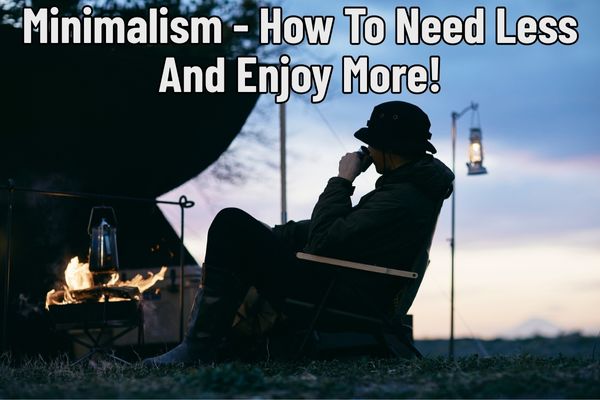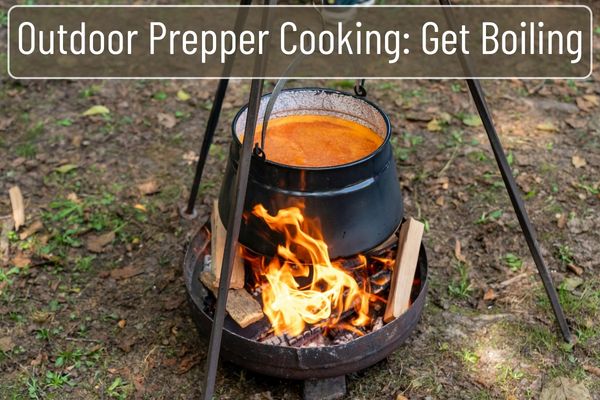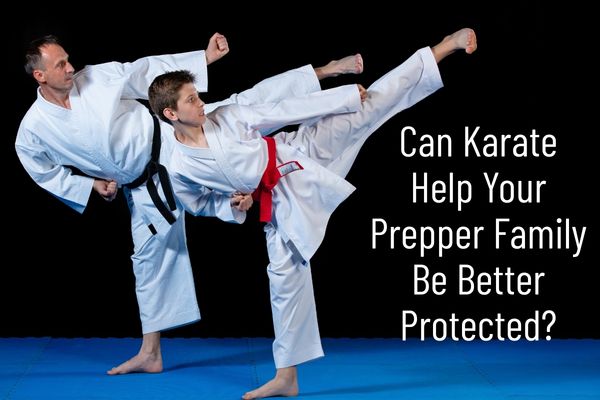Preppers understand that minimalism doesn’t have to mean doing without or having one’s needs unmet.
Being a minimalist can help people be truly happy while caring about what matters most.
While prepping focuses on accumulation – stockpiling food, supplies, gear, and resources – preppers understand that true security and joy come from being happy with less and knowing what really matters.
The Philosophy of Intentional Preparedness
The minimalist prepper understands that every possession carries hidden costs – not just financial, but temporal, spatial, mental. Each item demands attention, maintenance, storage, and decision-making. By applying minimalist principles to preparedness, we eliminate these costs while maximizing the utility of what remains.
This philosophy recognizes that true preparedness isn’t about prediction, but adaptation. When you’re comfortable with less, when you’re comfortable with change, and skilled at making do with the resources at hand, you become ready for scenarios you never imagined.
Building Psychological Resilience Through Voluntary Simplicity
Minimalism creates profound psychological advantages during crisis. When you regularly choose simplicity, you develop “psychological flexibility.” You’re able to adapt your behavior to changing circumstances and long-term values rather than immediate impulses or external pressures.
Living with less trains your brain to find satisfaction in fundamentals rather than complexity. This neural rewiring proves invaluable when external circumstances enforce simplicity. The minimalist finds pleasure in a simple meal, in meaningful conversation, or peaceful moments in nature. So, they maintain emotional stability even when sophisticated entertainment and comfort become unavailable.
Voluntary discomfort (sleeping on the floor, eating simple foods, taking cold showers, or walking instead of driving) builds what psychologists term “distress tolerance.” This practice immunizes you against the shock and demoralization that often accompanies sudden lifestyle changes during emergencies. When comfort becomes scarce, you maintain calmness because discomfort isn’t foreign or threatening.
Embracing the ability to live with less trains decision-making muscles crucial during crises. When we evaluate what to keep and what to discard, we develop rapid assessment skills for value, utility, and necessity. This agility proves essential when quick decisions about resources, routes, or risks can determine survival outcomes.
Strategic Selection: The Art of Multi-Purpose Minimalism
The minimalist prepper’s greatest skill lies in selecting items that serve multiple functions while occupying less space and requiring less maintenance. Consider the hierarchy of human needs when selecting your essentials. Shelter, water, food, and security form the foundation, but within each category, choose items that fit multiple categories. A high-quality tarp can help with shelter, water collection, ground cover, and signaling.
A key principle is versatility … selecting items multiple functions. A good knife doesn’t just add cutting capability; it enables food processing, tool making, defense, fire starting, and countless other functions that unlock entirely new possibilities from other simple items.
This approach extends to skills and knowledge. Learning one fundamental skill often unlocks multiple applications. Understanding fire starting from simple materials doesn’t just provide warmth … it enables cooking, water purification, tool making, signaling, pest control, and psychological comfort. Each skill you master reduces the number of specialized items you might need while increasing adaptability.
The Economics of Enough: Redefining Security
Minimalism reframes economic security. Instead of asking “How much do I need to feel secure?” the minimalist asks “How little do I need to be genuinely happy?” This shift creates profound financial and psychological advantages that compound over time.
When your baseline for contentment requires less, you achieve financial independence faster and with less risk. The minimalist prepper can often do more with emergency funds because their emergency lifestyle closely resembles their normal lifestyle. Reduced monthly expenses mean reduced income requirements.
This economic efficiency extends to investments, too. Instead of spending thousands on specialized gear that serves narrow purposes, the minimalist prepper invests in fewer, higher-quality items that serve multiple functions and provide value in both normal and emergency situations. For example, a good wood-burning stove heats your home, cooks your food, and creates ambiance for daily life.
When your needs are more on the simple side, you can relocate quickly, change lifestyles easier, or pivot to new opportunities.
Practical Systems for Resilient Simplicity
Implementing minimalist preparedness requires systematic thinking about essential functions rather than specific items. Start by identifying the irreducible core of human needs, then build simple systems that address these needs with maximum efficiency and minimum complexity.
Water systems illustrate this perfectly. Instead of stockpiling bottled water, the minimalist prepper might invest in water purification capabilities (filters, boiling equipment, and knowledge of local water sources).
Food systems follow similar logic. Preppers will be satisfied with simple, nutritious food and won’t overly miss the more extravagant dishes that might have enjoyed before an emergency.
And while everyone enjoys a beautiful home, a prepper will be happy with a shelter that provides safety and protection. An experienced prepper knows that, in time, better shelters can be built and that a temporary shelter that keeps everyone safe is enough for the moment.
The minimalist prepper also develops social systems rather than relying solely on oneself. Building relationships with neighbors, learning community skills, and contributing to mutual aid networks creates resilience that no amount of individual stockpiling can match.
Mental Models for Thriving with Less
The transition from abundance-based security to sufficiency-based security requires new mental models that reframe challenges as opportunities and limitations as creative catalysts. This shift often proves more valuable than any physical preparation because it determines how you interpret and respond to changing circumstances.
Instead of constantly upgrading your baseline for comfort and convenience, occasionally downgrade it through voluntary simplicity practices. Spend time in basic conditions, eat simple foods, sleep on hard surfaces, and work with minimal tools. These practices reset your appreciation baseline while building confidence in your ability to thrive with less.
Practice “satisficing” rather than maximizing. Sometimes choose options that meet your criteria for good enough rather than constantly seeking optimal solutions. This mental discipline reduces decision fatigue during normal times while building crucial cognitive efficiency for crisis situations where perfect information and unlimited time for decisions aren’t available.
The Liberation of Reduced Dependency
Perhaps the greatest gift of minimalist preparedness is the profound sense of freedom that emerges when you discover how little you truly need to live well. This realization liberates you from countless fears, obligations, and limitations that keep many people trapped in unfulfilling but “secure” situations.
When you know you can be genuinely happy with basic food, simple shelter, meaningful work, and good relationships, you become immune to many forms of economic and social coercion. You choose a job based on purpose rather than salary … live in places you love rather than where jobs demand … and pursue relationships and experiences that align with your values rather than your financial obligations.
This freedom compounds because reduced needs mean reduced vulnerability to disruption. Economic downturns, supply chain interruptions, energy crises, and social upheavals become more manageable challenges when your baseline requirements are modest and your adaptation skills are strong.
The minimalist prepper often discovers that their lifestyle is more satisfying than their previous abundance-based lifestyle. Finding joy in good health, family, and friends provides deeper fulfillment than high priced luxuries and entertainments.
Integration: Living the Philosophy Daily
The true power of a minimalist mindset emerges through daily practice rather than theoretical understanding. Begin by gradually reducing your dependency on complex systems while building your appreciation of meeting basic needs. Practices to help you develop this love of minimalism could include learning to cook from scratch, growing some of your own food, developing repair skills, or reducing digital dependencies.
Create regular practices that simulate resource constraints while building appreciation for abundance. Occasional voluntary fasting teaches you control and appreciation, while building confidence in your body’s resilience. Periodically doing without your digital devices can reveal how much mental space technology consumption occupies while rebuilding your capacity for deep focus and present-moment awareness.
Let the practice of minimalism help refine your understanding of what you need versus what you think you need. Let it help you discover what provides lasting satisfaction versus temporary pleasure.
Through the practices of minimalism and preparedness you can learn to better prioritize what matters most while building genuine security through reduced dependency and increased adaptability. The result is discovering how much happier we can be when we cut back.




